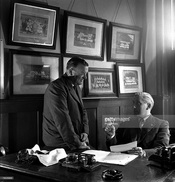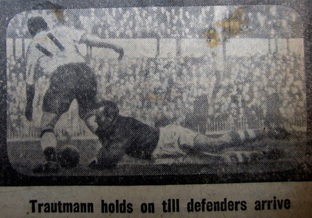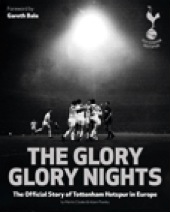 When Arthur Rowe resigned as manager due to ill health in the spring of 1955 he was replaced by his assistant Jimmy Anderson. He has divided Spurs fans over the years much as more recent managers have. Following Rowe and being succeeded by Bill Nicholson, history hasn’t been too kind to Jimmy. He did however in three complete seasons in charge finish second and third in the league and reached the FA Cup semi-finals. He also helped the transformation of the club between the two Championship winning seasons and brought a number of the Double side to the club. Jimmy had already completed forty six years at the club when he took over as manager having joined Tottenham even before the club entered the Football League. Anderson left with Arthur Rowe. We will concentrate on his spell at the helm of the club but we should mention his contribution of over fifty years service when he retired. Jimmy joined Spurs in1908 and his first jobs were to help weed the pitch and stand maintenance. After failing to make the grade as a player he worked in many guises over the years from office boy, kit man to helping with the training and becoming manager at Northfleet United the club’s nursery side in Kent. He undertook scouting duties and later became reserve team manager and then was appointed assistant manager to Joe Hulme in October 1946. He retained the post when Arthur Rowe became manager. He stepped up several times when Rowe was ill, just as he had when Hulme was unwell. When Rowe finally resigned towards the end of the 1954/55 season the club appointed Jimmy as manager and made Bill Nicholson the team coach. Jimmy realized that his main role was to rebuild the team that had won the League in 1951. One of Rowe’s faults was that he had remained too loyal to the men that had won the Championship. Several reserves had failed to make the grade and Anderson found himself with an aging side. In the summer of 1955 Tottenham toured Europe. With Nicholson stepping up into the management team Alf Ramsey (1) left for Ipswich where he would become manager and win the league in 1962. Another major contributor to the recent past was Eddie Baily who would leave for Port Vale in the coming season. That first Anderson season, 1955/56, can be divided into three parts. The first saw Tottenham start badly and were rock bottom for weeks. The second came at the turn of the year as Tottenham pulled themselves up the table and launched an impressive FA Cup run. The third came after Tottenham’s Cup exit as they fell back down the table. The season started really poorly and had only one point after six games. That had come in a draw at Manchester United who would win the league. The seventh game was at home to Arsenal and Tottenham won 3-1. As pleasing as this distraction was the form remained poor and we stayed bottom and after fifteen games we had six points (two for a win) our second win had been at home to Newcastle. Bobby Smith arrived from Chelsea, at first he played inside left and Maurice Norman (2) came from Norwich. November saw three wins in a row with wins at Manchester City and Aston Villa and home to Wolves. One point from the next three games brought us to Christmas.  I’m sorry for the image but it’s a scanned newspaper, but felt it could be included so you can judge was it a penalty ? I’m sorry for the image but it’s a scanned newspaper, but felt it could be included so you can judge was it a penalty ? Many regulars at the Lane felt there was a change in fortunes started V Luton at home on Christmas Eve (Bobby Smith’s debut) followed by another victory two days later V West Brom. A win at Charlton on New Years Eve and then January started with the FA Cup win at home to non-league Boston. The following week brought a 1-0 win at Highbury. The Cup run brought great relief to the terraces with wins at home to Middlesbourgh and away to Doncaster.The sixth round saw us draw 3-3 at home to West Ham and win the replay 2-1 at Upton Park. The semi -final took us to Villa Park and Manchester City. We will return to that game in a moment. After the win at Arsenal the team clawed their way up the table slowly with six points from five games including wins at Newcastle and 4-0 at home to Chelsea. The last game before the semi was a 1-1 draw at Portsmouth. That game saw Tommy Harmer become the sixth man to play at outside right that season. However Tommy (3) was a very slight man and had received a fair bit of rough treatment. This caused Anderson to question of he was the right man to play in the Semi and Dave Dunmore was recalled. Blanchflower (4) had felt dropping Harmer had disrupted the teams rhythm. Tottenham lost to a late goal after being denied a certain penalty when George Robb had been brought down by Bert Trautman (5) as he was about to slide home into an empty net.
Tottenham who had looked like they were safe slowly slid back down the table with just ten points coming from the last eleven games. Although the first game after Manchester City knocked us out of the Cup was a 2-1 win at home to the same opponents. The harmony of the side wasn’t helped by a public dispute between Anderson and Blanchflower. In the Semi Blanchflower had sent Norman forward to aid the attack but the strategy had not paid off. Anderson was livid that this had not been his instructions. Blanchflower’s counter was he had done exactly the same earlier in the season and it had worked. At that time the change wasn’t mentioned so why was it wrong now. The last two games of the season arrived and Spurs one point it came in the 0-0 draw at Cardiff. However Blanchflower was dropped and Anderson said the player was injured. Blanchfower was asked and he declined to confirm he was claiming he was fully fit. This led to another disagreement and Blanchflower resigned the captaincy saying the captain must be permitted to make decisions on the field. Blanchflower did return for the last game of the year (under Harry Clarke as captain) a 3-1 win at home to Sheffield United with Bobby Smith (now playing number 9) scoring a hat trick. Tottenham finished 18th (out of 22) on 37 points, two ahead of relegated Huddersfield. Three points and two places worse than the season before. The Cup run had given the fans some hope and the following season 56/57 would see a big step up for the club and a personal triumph for Blanchflower as we will discover in Andersons second season in part 2. COYS Keith Harrison. t- Keith 16024542 f- peter shearman (old non de plume) View Full Bio Notes - 1 - Hotspur Towers - Alf Ramsey 2 - The Colossus of Tottenham 3 - Tommy Harmer, ‘Harmer the Charmer’ widely regarded as one of the most talented players of his generation will feature in the Hotspur Towers series shortly. 4 - Hotspur Towers - Danny Blanchflower 5 - Bert Trautman the City goalie came to this country as a German prisoner of war and famously broke his neck in the Cup Final. What is often not mentioned that during the war he won the Nazi Iron Cross, twice.
1 Comment
keith
6/3/2017 01:42:58 pm
pls note links to rest of series are
Reply
Leave a Reply. |
Features
Flying Down to Rio History of T.H.F.C. Tribute to Bill Nicholson Talking Tottenham Early Legends The Road to Turin International Connections Hotspur Towers Most Read Articles
The 100 Year War Interview with Marina Sirtis A Long Dark Shadow By Royal Appointment School Report: An Insight into the Younger Eric Dier Dear Jimmy All Change At Spurs Hotspur Towers History Of THFC: Part 1 Passage to India: Rohan Rickets Thanks For The Memories Our Tommy Carroll The AVB Files: Part1 The Lilywhites You The Jury The Hand Of Hugo Connection - Argentina Creating a Reputation One Hotspur Archives
August 2018
Categories
All
|
 RSS Feed
RSS Feed

